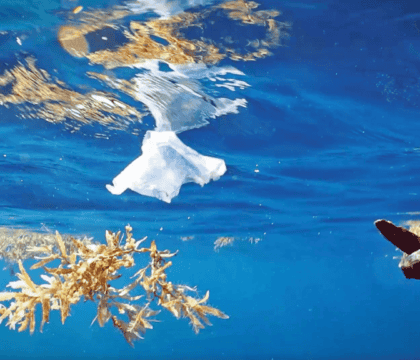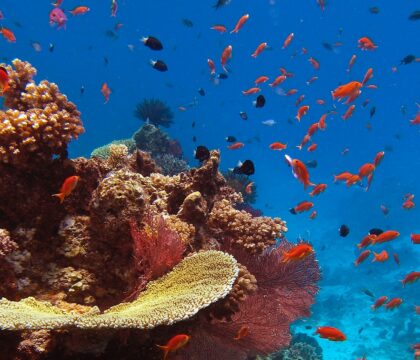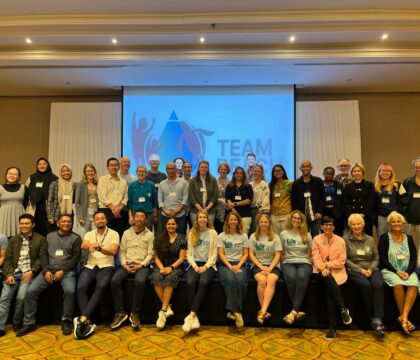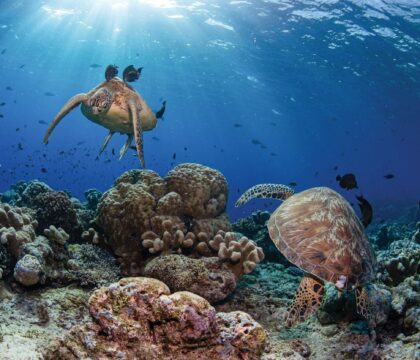February 15, 2024 • Program Updates
Back in 2008, plastic pollution threatened both the environment and the economy of Watamu, Kenya, a small and picturesque coastal town renowned for ecotourism, beaches, and ocean wildlife. The 37 tons of plastic pollution washing onto Kenya’s shores per year hit a tipping point, impacting the coral reefs, polluting the beaches, and driving away tourists, damaging businesses that depended on them.
To make matters worse, much of the Watamu community competed for the same dwindling natural resources. Local fishermen wanted to fish coral reefs for their own livelihoods, while dive operators sought to protect the reefs for ecotourism. Resorts blocked beach vendors from hotel grounds as they sought to isolate their increasingly few wealthy customers, and the trickle-down economic impacts of affluent visitors ceased.
The crisis led to a gathering amongst representatives from local businesses, environmentalists, and tourism operators to discuss the challenge and find solutions. The result was simple: plastic waste could be removed from the coastline and repurposed as part of a “circular economy”, thereby protecting the environment while creating jobs.
“The circular economy simply redirects waste, it doesn’t dispose of it,” explained Steve Trott, a long-time naturalist with the Oceanic Society and founder of Watamu Marine Association (WMA), a nonprofit based in Watamu. WMA was born from the crisis in 2009 with the mission to repurpose pollution into artwork and consumer goods entirely made from plastic.
Transforming Local Economies
“Our big focus is on plastic, as plastic has a high value and… is the big problem,” said Trott. Since the launch of their programs, over 500 community members in Watamu now earn income by selling plastic they’ve collected from the beach to WMA, removing on average 10 to 20 tons of plastic from the coastline each month. Hotels that once shunned local vendors now sponsor beach cleaners to visit their resorts.
Although plastic pollution must be eliminated entirely to effectively protect the planet from its damaging effects, existing plastic must also be removed from the ecosystems they already pollute. This removal process not only presents an economic opportunity for those that collect and repurpose the waste, but also protects valuable community eco-tourism assets like beaches and coral reefs which attract wealthy tourists both from within Kenya and internationally.
Yet the job creation in rural Kenya doesn’t end with collecting and reselling plastics. Recycling facilities run by WMA’s partner, Eco-World, then process the collected material – thus creating more jobs and training workers with high-value skills. Then, artisan handcrafters receive the recycled material and transform it into beautiful pieces of art and bags, which they sell to tourists.
“We’ve now created dynamic plastic waste value chains. We’ve now created jobs – income – for hundreds of people. And we’ve now redirected all of that recyclable waste away from the waste disposal stream. So this is the ‘circular economy’, this is how it can work,” said Trott.
Creating Opportunity
The jobs created by the circular economy programs are a viable source of income for many in Watamu and across coastal Kenya. Winfred Mutua, a Watamu local, has worked with WMA and Eco-World in various capacities for the last 15 years.
She initially learned about the potential of plastic collection as a source of income when she joined an ocean cleanup event 15 years ago. At the time she worked as a shopkeeper, but the difficult economic conditions in Watamu meant she struggled to support her family with an income. Working in plastic waste management opened her eyes to new business opportunities.

Winfred Mutua sorts through plastic waste at an Eco-World processing facility.
“Before we joined WMA, plastic was scattered everywhere. The community did not know the usefulness of plastics or the management of waste plastics,” Winfred shared. She continued, “So people were not bothering with how to collect. But when we joined WMA, we got training. We were trained on how to manage waste, plastics, and make them useful. So for now, I can say WMA has improved our lives because now we know how we can manage plastic and make our place’s beaches free from plastic pollution.”
Now, through her work with WMA she is able to afford to educate her children and pay rent for their family home. In the future, she hopes to build on the success of Watamu’s circular economy programs and to educate people on proper plastic pollution waste management.
Fostering a Global Movement with Oceanic Society
The potential for partnership with circular economy efforts in hotspots like Watamu extends well beyond the local businesses. For example, each individual booking of a multi-day trip with Oceanic Society directly sponsors the removal of 200 pounds of plastic pollution by funding the salaries of beach cleaners at WMA. Additionally, Oceanic Society’s award winning tour of Kenya takes visitors to Watamu, where they will see the circular economy work firsthand after experiencing the area’s natural wonders.
“That partnership has created a link between Oceanic Society clients and how they can link directly to our beach cleaners and recyclers here in Watamu on the Kenya coast,” Trott explained. “It’s not often that you see a direct flow of support and funds actually going 100 percent to the effort on the ground, which then have 100 percent impact and a direct environmental impact, a direct conservation impact, a direct and measurable socio-economic impact for local communities.”

Steve Trott (center-left) and Winfred Mutua (center-right) collecting plastic waste with other beach cleaners near Watamu.
The benefits of the circular economy are not only felt at the grassroots level. The plastic recycling programs that WMA and Eco-World implement have been lauded as frontrunners in sustainable waste management by the U.S. government. The Kenyan government has since taken action to protect their natural wonders – a core aspect of the economy – from the damaging effects of plastic waste. They banned single use plastic bags in 2017 and followed up with barring single-use plastics from national parks, beaches, and conservation areas. New regulations will force companies selling products in Kenya to reduce their waste starting in 2024.
Trott anticipates that WMA will provide income to over 1,000 people as beach cleaners, collecting over 50 tons of plastic waste per month by the end of 2024.
He hopes the model can be replicated around the world, “If we can do it in Watamu, then clearly it can be done in other resort towns and not just in Kenya… our plans are to expand it to the East Africa coastline. But this is a model that can be replicated in developing countries and especially coastal resort towns that have a hotel industry producing waste, producing recyclable waste.”




